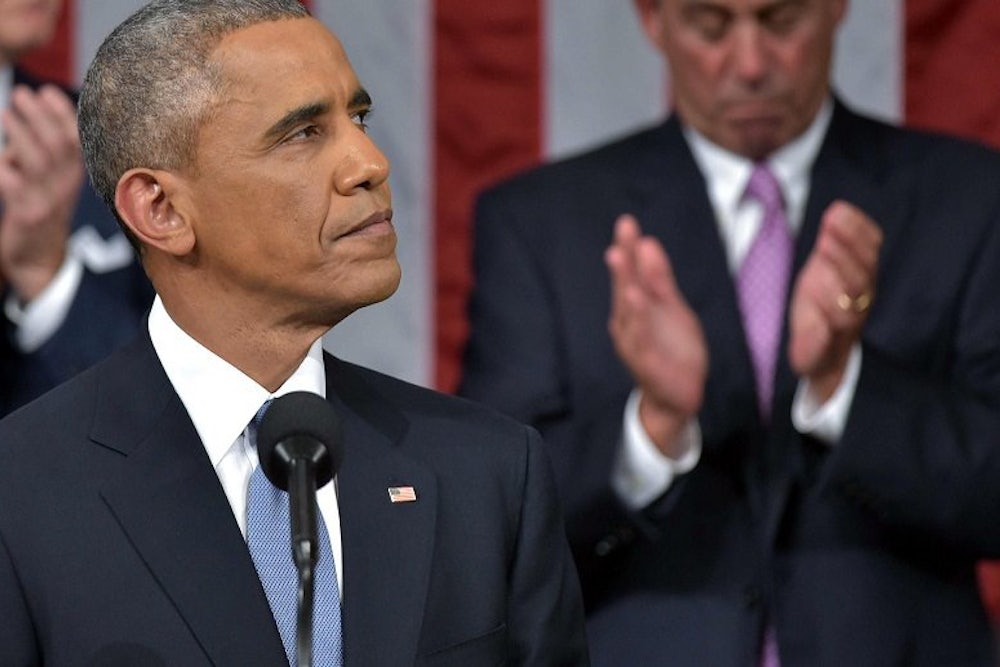The Wall Street Journal published an editorial Wednesday morning with a big claim: That jobs growth in 2014 occurred not because of the president’s policies, but despite them. “Mr. Obama is now taking credit for 2014’s job gains that his policies inhibited, much as he is for the boom in oil and gas drilling that his Administration resisted,” they write. Representative Paul Ryan’s office is blasting the editorial around as well. But the editorial is badly flawed as it rests on a questionable study and ignores other academic research that comes to the opposite conclusion.
Instead, it should be read as part of a multi-pronged conservative effort to twist the recent economic improvement into a political liability for the president. That effort has intensified in recent weeks as Obama’s favorability numbers have surged. But each attempt to spin the economic data against Obama only further reveals the inadequacy of the conservative position.
The study in question, by economists Marcus Hagedorn, Iourii Manovskii and Kurt Mitman (I’ll call the study “HMM” for short), was published this week in the National Bureau of Economic Research and quickly shot through the conservative blogosphere. The authors found that the expiration of long-term unemployment benefits at the end of 2013 was responsible for 1.8 million of the approximately three million jobs created last year. That’s a huge amount and, if true, would completely refute the liberal argument that extended unemployment benefits have not held back the economy. But this study is flawed and was easily and quickly debunked by economists earlier this week.
First, HMM are not suggesting that unemployment benefits discourage the unemployed from accepting jobs, as the typical conservative argument goes. Instead, they hold that cutting unemployment insurance (UI) increased job growth on the macro level: Lower benefit levels lowered the wages that employers had to offer potential employees, freeing up more money to hire other workers. That’s an unusual mechanism for how UI hurts the economy—one that even some conservatives aren’t buying.
The problems don’t end there. At the Center for Economic and Policy Research, economist Dean Baker finds major issues with the data HMM use in their study. Mike Konczal, an economist at the Roosevelt Institute, added to Baker’s piece, pointing out problems with the models HMM used. Konczal also points out that HMM’s study and the Journal’s editorial both ignore vast amounts of research on unemployment insurance, data that indicate UI has only a very minor effect on job growth.
This isn’t the only attempt by conservatives to deny Obama credit for the improving economy. Writing at City Journal, Steve Malanga, a senior editor at the Manhattan Institute, argues that red state policies are largely responsible for the improving economy because manufacturing jobs returned to states with Republican governors; he also argues that Obama isn’t responsible for the drop in gas prices. This isn’t exactly wrong, but it also vastly overstates how much Republicans should be credited for those results. Malanaga, for instance, cites the president’s claim that the manufacturing industry has created 800,000 jobs since 2010. He suggests that most growth is due to conservative policies, like right-to-work laws and low corporate tax rates. But the economy as a whole has added more than 10 million jobs since 2010, and manufacturing is only a small part of that. To be fair, Malanga is just pushing back on the president’s own talking point. That talking point is flawed, though, so Malanga’s argument is as well.
On oil prices, Malanga is right. Obama doesn’t deserve praise for the recent fall in gas prices, from which he’s surely benefiting politically—falling gas prices are a huge factor in the recent surge in American optimism on the economy. But Republicans cannot claim sole credit here either. The dropping prices are also due to reduced demand from Europe and OPEC’s decision (read: Saudi Arabia) to not reduce its supply of oil.
Over the past few weeks, I’ve dissected four different conservative arguments for why Obama doesn’t merit credit for the improving economy: that it was the result of sequestration; that the labor force participation rate has fallen; that income inequality has risen; and now, that the economy improved despite Obama’s policies. This was quite easy to do. But these arguments represent a clear attempt by the right to stem the growing feeling across the country that President Obama deserves credit for the improved economy.
In some sense, conservatives are right. Falling gas prices really are a huge factor in the recent surge in American optimism on the economy—and Obama doesn’t deserve any credit for that. But this gets at a more fundamental feature of American politics: Presidents don’t have much control over the economy. They have to work with Congress to pass laws and the Federal Reserve is a far more important actor in the economy than both the legislative and executive branch.
Voters give the president far too much blame and credit for changes in the economy. Conservatives are certainly frustrated by that right now. But for most of Obama’s presidency, liberals have been the frustrated ones. Voters have disapproved of the president’s handling of the economy despite the fact that his economic agenda has been very good. In other words, don’t think of the recent surge in the president’s approval ratings as undeserved. Think of it as a long overdue reversion to the mean.
